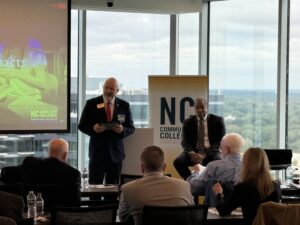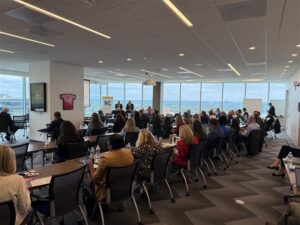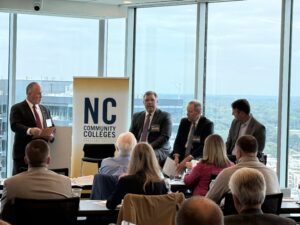At 2025 Summit, State Board of Community Colleges Charts Transformative Path for Workforce Development, Student Success

Published: October 1, 2025
The North Carolina Community College System hosted the 2025 State Board Summit, Transformation for Student Success, September 17–18 in Raleigh. The two-day event brought together legislative leaders, business and economic development experts, and education pioneers to strategize the future of higher education and workforce development in North Carolina.
The summit emphasized the System’s role in fueling economic growth, preparing students for high-demand careers, and ensuring the state remains competitive in a rapidly changing job market.
The event opened with Board Chair Tom Looney sharing his vision for the summit to be the catalyst for designing a bold vision for North Carolina’s 58 community colleges.
“The summit is an opportunity to step back, look ahead, and set the course for the future of our system,” Looney said. “We can’t move the Community College System forward unless we operate as a team. A strong value proposition drives investment, and the ‘Great 58’ are poised to deliver on that promise for North Carolina’s students and employers.”
He highlighted three major transformations in North Carolina — in business, economic development, and education, including:
- Lenovo, which grew from Chinese roots into the world’s top PC company, thanks in part to local and state investment in its Morrisville HQ;
- Economic Development Partnership of North Carolina, which has shaped the state’s economic vision for more than a decade; and
- The expansion of the NC School of Science and Math to Morganton — a move he said was only possible through strong legislative support.
Looney played a key role in all three but emphasized they reflect a shared commitment to bold, collaborative action.
 Legislative Support and Economic Growth
Legislative Support and Economic Growth
The event opened with The Legislative Vision for NCCCS, a panel featuring Representative David Willis, Senator Brad Overcash, and Alex Fagg, Vice President of Government and External Relations. The discussion underscored the General Assembly’s ongoing support for community colleges as a driving force behind education and workforce preparation.
Willis, a graduate of Stanly Community College and former State Board member, urged the System to operate more cohesively.
“I have had a heart for the community college system for a number of years now. We love to talk about the Great 58, but we’ve got to start thinking more systematically in how we do things,” he said, pointing to opportunities for expanded student access, reduced red tape, and greater efficiency.
Overcash echoed that perspective, emphasizing his support for the community colleges, and stressing the importance of community colleges “moving at the speed of business” to meet workforce and economic development demands.
“There’s a commitment from this General Assembly to support our community colleges and our System. If given a plan to succeed and a business-minded focus, we will be here to partner with you,” Overcash said.
A following session, #1 in Business: NCCCS Role in Economic Growth, brought together Andrew Tate of Duke Energy, Scott Millar of Catawba County Economic Development Corporation, Donny Hicks of Gaston County Economic Development Corporation, and John Loyack, Vice President of Economic Development at the System.
Panelists highlighted the indispensable role community colleges play in developing a skilled workforce that attracts and sustains business investment statewide.
“We have never won [a business recruitment] project without presenting a workforce solution that naturally includes community colleges,” Tate said. “I have watched [NCEdge] customized training push a project over the edge to make North Carolina the winning state.”
Panelists encouraged continued engagement between the community college system and economic developers, emphasizing the importance of effectively explaining and promoting North Carolina’s workforce development assets.
 Collaboration Between K–12 and Postsecondary
Collaboration Between K–12 and Postsecondary
Collaboration was another major theme. Collaboration for Impact: K–12 + Postsecondary, led by Superintendent of Public Instruction Maurice “Mo” Green and System President Dr. Jeff Cox, focused on strengthening pathways from high school to community college.
Green outlined an ambitious vision: by 2030, North Carolina will have the best public school system in the nation, supported by strong community college connections.
Key goals include:
- Dual Enrollment: Increase the percentage of high school graduates enrolling in at least one dual enrollment course to 41% by 2030.
- CTE Participation: Boost participation in Career and Technical Education courses from 36.1% to 42% by 2030.
- Credentials Earned: Increase the number of CTE credentials earned yearly from 358,069 to 500,000 by 2030.
These targets will enable more students to earn college-level credit, gain career-connected experiences, and move more quickly and affordably into high-wage careers.
“Collaboration between our K–12 schools and community colleges is one of the most powerful levers we have to transform the future of North Carolina,” Cox said. “When students can earn college credit and career credentials while they are still in high school, they gain confidence, momentum, and a clearer path toward meaningful careers.”
This emphasis on strong educational pathways was echoed by leaders in the tech industry. Hosting the Summit at the Pendo building in downtown Raleigh underscored the growing collaboration between North Carolina’s education system and its tech and business communities.
“The #1 way to predict whether an N.C. State student will succeed is whether they attended a community college,” said Eric Troan, Co-founder and Chief Technology Officer at Pendo.
Navigating Economic Shifts and AI
The summit also examined long-term economic trends. Dr. Laura Ullrich, Director of Economic Research at Indeed, provided an overview of the state and national economy, noting that job postings in North Carolina remain above pre-COVID levels, with strong demand in health sciences, skilled trades, and technology.
A major theme was the rise of artificial intelligence. Dr. Ullrich reported that:
- 65% of NC employers are already reporting skills gaps related to emerging technologies.
- 39% of workers’ core skills will require transformation by 2030.
- 59% of the workforce will need some form of retraining by 2030.
These findings highlight the urgency for community colleges to rapidly adapt programs to prepare students for an AI-driven economy. New opportunities like the upcoming Workforce Pell program will provide funding for shorter-term, career-focused training that matches student demand for high-ROI, stackable credentials.
Propel NC: Aligning Education with Labor Market Demands
A cornerstone discussion, Plan to Execute Propel NC Business Model, featured Dr. Dale McInnis, Dr. Brian Merritt, Dr. Phillip Price, Dr. Bill Schneider, and Alex Fagg. Propel NC is designed to ensure programs align directly with labor market demand, providing students with clear, high-value pathways into careers.
Key elements include:
- Regularly updated labor market analyses to track job openings and average earnings by sector.
- Streamlined approval processes to help colleges respond quickly to workforce needs.
- Employer engagement to design training that is relevant and effective.
- Development of a Workforce Pell Toolkit to help students access funding for high-quality, stackable credentials.
Propel NC focuses on high-demand fields such as healthcare, engineering and advanced manufacturing, trades and transportation, and information technology.
Transformational Change and Student-Centered Innovation
The summit also highlighted how community colleges are driving transformational change with a panel of three presidents.
Dr. Mark Sorrells, president of Fayetteville Tech, shared a case study on the Carolina Cyber Network, a statewide collaboration to address the shortage of cybersecurity professionals.
Dr. Vern Lindquist, president of Johnston Community College, shared a live demonstration and case study on improving engagement and enrollment of students by leveraging a customer relationship management (CRM) platform supported by AI, good data systems, and intentionally honed operational processes.
Dr. Sandy Stewart, president of Sandhills Community College, shared insights on how his college is leveraging strategic planning to adopt a one college model for serving students that includes bolstering short-term credential enrollment as early as high school.
Day Two continued this focus with System Transformation for Student Success, which emphasized improving the student experience through modernized processes, technology, and support systems. Scott Ottman, Chair of the State Board Transformation Committee, outlined efforts to integrate people, processes, and technology to better serve students.
Presentations by Dr. Andrea Crowley, Executive Director of the Student Success Center, and Dr. Lane Freeman, Director of Online Learning Programs, introduced innovative tools like the “Pivot Platform,” which will use adaptive learning and personalized recommendations to guide students through their pathways.
A final panel session brought together national leaders to share real-world examples of large-scale change in higher education systems. Moderated by Tom Looney, the panel featured Dr. Dan Greenstein and Rosa Lara of the Pennsylvania State System of Higher Education, Dr. Kate Akers of the Data Quality Campaign, and Dr. Christina Whitfield of SHEEO.
The discussion highlighted how leadership, collaboration, data, and technology have driven student-centered transformation efforts in Pennsylvania and Kentucky. Panelists emphasized that the ultimate beneficiaries of these efforts are students—through improved access, stronger outcomes, and better alignment with community needs.
As the summit drew to a close, one theme was clear: North Carolina’s community colleges are not only responding to change, they are helping to define the state’s future. With leaders aligned around collaboration, innovation, and student success, the System is positioned to deliver the skilled workforce and educational opportunities North Carolina needs to stay competitive.
Planning is already underway for the 2026 State Board Summit, which will build on this year’s progress and continue shaping a bold vision for the Great 58 and the communities they serve.

